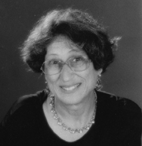
About Liliane Atlan
Hommage à Liliane Atlan:
Salut à Liliane (138 min)
D. Cohen - écrivain - A. Gatti - dramaturge - J.C. Grumberg - écrivain - G. Israël - philosophe - H. Karagheuz - comédienne - F. Lauzon - R. Monod - comédien - M. Rayer - comédienne - V. Théophillidès - comédienne -P. Vial - acteur
Liliane (Cohen) Atlan, was born on January 4th, 1932 in Montpellier in a Jewish family native of Saloniki . During the Second World War, she was kept hidden with her sister Rachel in Auvergne and in the South of France. At the liberation, she learned that all her mother's family had been killed. She did not understand why she had survived while so many others had died. The guilt of the survivor pursued her all her life. After the war, her parents searched for relatives, welcoming survivors of the Shoah. They adopted a young man, Bernard Kühl, who had lost his family in Auschwitz. He told her about the camps. She was thirteen years old, a teenager. The trauma caused by the narrative of the survivors came out as an anorexia. She entered then the Gilbert Bloch School in Orsay, established by Robert Gamzon. He suggested helping the young Jews traumatized by the war and the Shoah to reconstruct their Jewish identity by the study of the Jewish history and the Talmud and thus to give a direction to their lives. In 1952 Liliane married Henri Atlan, another member of the community of the school. Two children arise from this union. Divorced of Henri Atlan, she kept her name. She understood that she was not designed in order to live for herself, but for the sake of to make relive the reality of the Nazi concentration and extermination camps (See "The Passersby", Published in 1993 by Henry Holt and Company, Inc. originally published in France in 1988 by Editions[מא2] Payot under the title "Les Passants". This book won The Wizo Prize).
Liliane Atlan began her literary career by publishing A collection of poems, under the name of Galil, "Les Mains Coupeuses de Mémoire" in 1958, then a first play, "La Vieille Ville" (the old city of Jerusalem in 1948). Liliane Atlan lived two years in California from 1966 till 1968 and returned to Paris for the production of her first big play, "Monsieur Fugue ou le mal de Terre" (Mister Fugue or the illness of earth) inspired by the life of Janusz Korczak. It was directed in 1967 in Saint-Etienne theatre by Roland Monod, and resumed in 1968 in Paris at the TNP. In 1969, "Les Portes" (The Doors) was produced in the ORTF. The theme of doors, which lock the human beings and isolate them, is often recurrent in the work of Atlan. In 1971, "La petite Voiture de Flammes et de Voix" (The small wheelchair of Flames and Voice) was produced at the Festival of Avignon. In 1989 France Culture broadcasted "Un Opéra pour Terezin" (Opera for Terezín).
In 1994 Atlan was honored with a retrospective of her work presented at the on the "Festival of Avignon ". In 1999 she was granted the Prix Mémoire de la Shoah (The Memory of the Shoah Award) by the Fondation Buchman.
Liliane Atlan died in February, 2011, in Israel.

